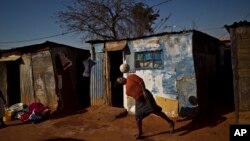JOHANNESBURG —
A research group is appealing for what it calls “radical reconciliation” in South Africa as the nation approaches the 20th anniversary of the end of apartheid. The report by the Institute for Justice and Reconciliation found stark inequalities that continue to fall along race lines.
The new study makes some heartening findings as South Africa approaches 20 years of democratic rule. Yet it also shows that the nation’s old wounds go very deep.
One of the survey’s key findings is somewhat encouraging: just two decades after South Africa ended its race-based apartheid system, class is now more important to many South Africans than race.
However, researchers also found that South Africans at the very bottom of that scale are nearly all black, sais Kim Wale, lead author of this week's report.
"One of our key findings is that South Africans report that class inequality has become the greatest impediment to national reconciliation," Wale said. "However, class inequality continues to reflect racial division.”
The nation’s last census backed that up, showing that on average, white South African households earn more than six times what black households do. Researchers interviewed more than 3,500 South Africans in all nine provinces for the institute's survey.
Little faith in government
Wale also noted that South Africans have less faith than ever in their government, with confidence in the national government dropping 11 percent since last year.
The report calls for South African leaders to seek what the authors call “radical reconciliation.” That is sure to become a talking point in next year’s national election, with new opposition parties are already calling for the government to nationalize key resources in a bid to address economic inequality.
Wale says the party that wins needs to make a serious attempt to address inequality.
“So basically radical reconciliation, it tends to push us beyond the psychological and interpersonal dimensions of the concept of reconciliation to emphasize the importance of addressing material inequalities," she said. "And it proposes that for national reconciliation we need both of these legs: the psychological and interpersonal reconciliation, and also the socioeconomic transformation.”
Wale says the survey results are not surprising considering South Africa’s history.
"Apartheid was a very powerfully created system of inequality, it’s going to take a lot of work to undo that. So it makes sense that at this stage, 20 years into democracy, we need to start asking the hard questions in relation to reconciliation."
This discussion is expected to continue on the national stage as South Africa heads to the polls next year.
The new study makes some heartening findings as South Africa approaches 20 years of democratic rule. Yet it also shows that the nation’s old wounds go very deep.
One of the survey’s key findings is somewhat encouraging: just two decades after South Africa ended its race-based apartheid system, class is now more important to many South Africans than race.
However, researchers also found that South Africans at the very bottom of that scale are nearly all black, sais Kim Wale, lead author of this week's report.
"One of our key findings is that South Africans report that class inequality has become the greatest impediment to national reconciliation," Wale said. "However, class inequality continues to reflect racial division.”
The nation’s last census backed that up, showing that on average, white South African households earn more than six times what black households do. Researchers interviewed more than 3,500 South Africans in all nine provinces for the institute's survey.
Little faith in government
Wale also noted that South Africans have less faith than ever in their government, with confidence in the national government dropping 11 percent since last year.
The report calls for South African leaders to seek what the authors call “radical reconciliation.” That is sure to become a talking point in next year’s national election, with new opposition parties are already calling for the government to nationalize key resources in a bid to address economic inequality.
Wale says the party that wins needs to make a serious attempt to address inequality.
“So basically radical reconciliation, it tends to push us beyond the psychological and interpersonal dimensions of the concept of reconciliation to emphasize the importance of addressing material inequalities," she said. "And it proposes that for national reconciliation we need both of these legs: the psychological and interpersonal reconciliation, and also the socioeconomic transformation.”
Wale says the survey results are not surprising considering South Africa’s history.
"Apartheid was a very powerfully created system of inequality, it’s going to take a lot of work to undo that. So it makes sense that at this stage, 20 years into democracy, we need to start asking the hard questions in relation to reconciliation."
This discussion is expected to continue on the national stage as South Africa heads to the polls next year.
